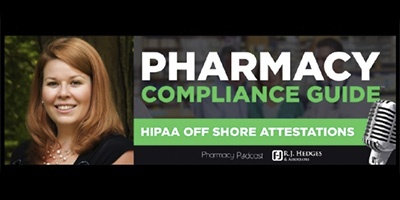Podcast Session 11 HIPAA Off-Shore Attestations

In order to stay competitive, many businesses are turning to offshore companies as a way to cut costs while still providing tech support, customer service, billing processes, and more. Consider your contracted companies with which you have signed a business associate agreement (BAA); could any of them be utilizing offshore workforces?
In the case of any breaches, the United States government won't have any legal recourse. Plus NCPDP and many PBM's are already asking for attestations stating your BAA's are not using an offshore workforce.
This podcast episode discusses the impacts offshore businesses will have and helps pharmacies take action as soon as possible.
Remember that business associate agreements are contracts; if you are signing a vendors BAA, make sure you read it, understand it, and agree with it, because once it’s signed your stuck with it.
Draft a document that mirrors the contract PBMs, ask your pharmacy to sign and have any business associates check one of the two boxes prior to returning it. Once this is completed, your pharmacy can adequately answer any questions from the NCPDP and PBMs.
